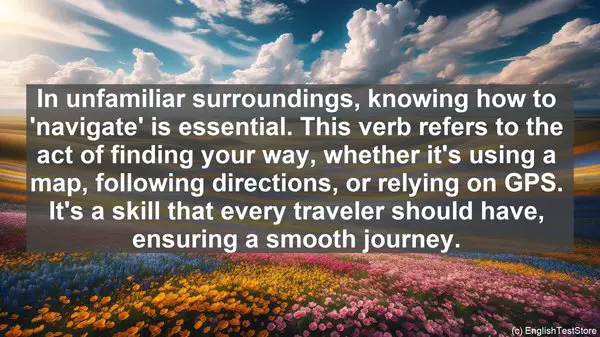Introduction: The Importance of Verbs in Describing Travel
When it comes to describing travel and transportation, verbs play a crucial role. They bring action and movement to our sentences, allowing us to vividly express our experiences. Today, we’ll explore the top 10 verbs that you should have in your travel vocabulary. Let’s get started!
1. ‘Go’ – The Ultimate Travel Verb
The verb ‘go’ is a must-know for any traveler. It’s incredibly versatile and can be used in various contexts. Whether you’re going on a trip, heading to the airport, or simply exploring a new city, ‘go’ is your go-to verb. Remember, it’s irregular in the past tense, so it becomes ‘went’.
2. ‘Arrive’ – Reaching Your Destination
After a journey, we all look forward to arriving at our destination. ‘Arrive’ is the verb we use to describe that moment. It signifies the completion of a trip and the beginning of new experiences. So, the next time you reach a new city or country, remember to say ‘I’ve arrived!’
3. ‘Travel’ – The Act of Moving
The verb ‘travel’ encompasses the entire experience of going from one place to another. It’s a broad term that covers various modes of transportation, be it by air, land, or sea. So, whether you’re taking a train, flying in a plane, or sailing on a ship, you’re ‘traveling’.
4. ‘Explore’ – Discovering New Places
Traveling isn’t just about reaching a destination; it’s about exploring and immersing yourself in new cultures and environments. The verb ‘explore’ captures that sense of curiosity and adventure. From famous landmarks to hidden gems, there’s always something to explore.
5. ‘Navigate’ – Finding Your Way
In unfamiliar surroundings, knowing how to ‘navigate’ is essential. This verb refers to the act of finding your way, whether it’s using a map, following directions, or relying on GPS. It’s a skill that every traveler should have, ensuring a smooth journey.
6. ‘Board’ – Getting On a Vehicle
When it’s time to get on a plane, train, or bus, we ‘board’ it. This verb indicates the action of entering a vehicle, ready to embark on a new leg of your journey. So, when you hear the announcement ‘Boarding now!’, it’s your cue to get on.

7. ‘Depart’ – Saying Goodbye
Just as ‘arrive’ marks the beginning of a trip, ‘depart’ signifies the end. It’s the verb we use when we’re leaving a place, bidding farewell to the experiences we had. Departures can be bittersweet, but they also mean new adventures await.
8. ‘Commute’ – Daily Travel
For many, travel isn’t just about vacations; it’s also a part of their daily routine. ‘Commute’ is the verb that describes this regular travel, often to work or school. Whether you take the bus, drive, or cycle, it’s all a part of your daily commute.
9. ‘Hitchhike’ – Adventurous Travel
For the more adventurous souls, ‘hitchhiking’ is an option. This verb refers to the act of getting a free ride from passing vehicles. While it’s not as common nowadays, it still holds a certain allure for those seeking unique travel experiences.
10. ‘Return’ – Coming Back
After a trip, there’s always the journey back home. ‘Return’ is the verb we use to describe that action. It signifies the end of your travel and the start of settling back into your familiar surroundings. ‘Return’ can also be used in the context of round trips.


